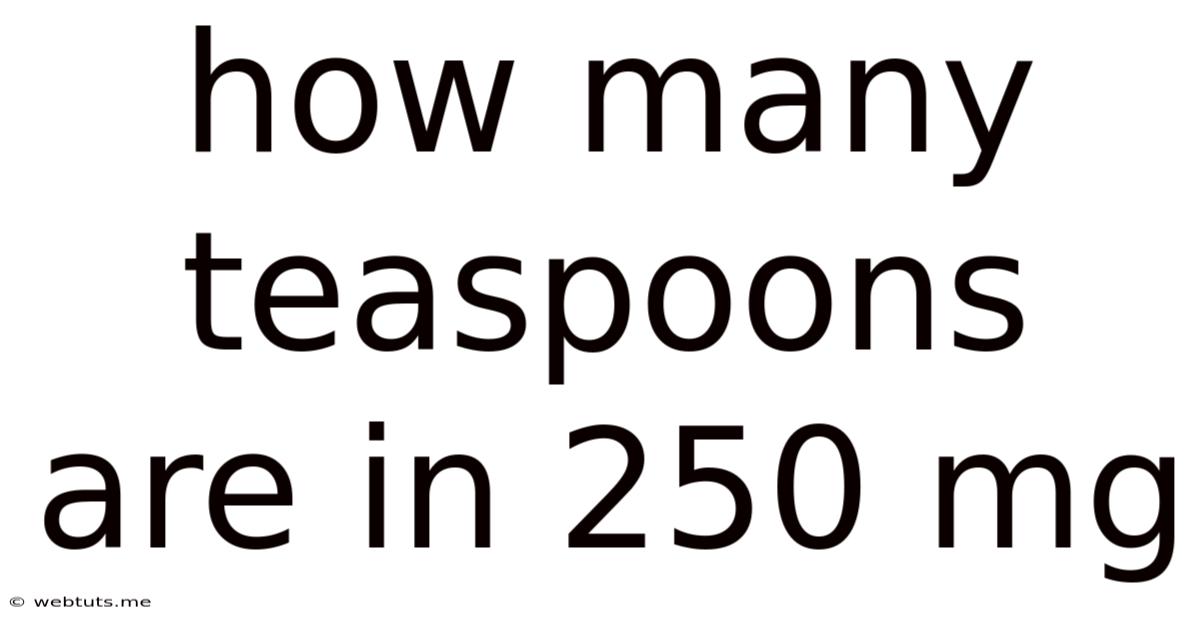How Many Teaspoons Are In 250 Mg
Webtuts
May 13, 2025 · 4 min read

Table of Contents
How Many Teaspoons Are in 250 mg? A Comprehensive Guide to Measurement Conversions
Understanding the relationship between milligrams (mg) and teaspoons (tsp) is crucial for accurate medication dosage, baking precision, and various other applications. This comprehensive guide will delve into the complexities of this conversion, providing a clear understanding and practical examples. We'll explore why a simple, direct conversion isn't possible and offer solutions for navigating this common measurement challenge.
The Problem: Why There's No Single Answer
The core issue lies in the fundamental difference between milligrams and teaspoons. Milligrams measure mass or weight, while teaspoons measure volume. The conversion between mass and volume depends entirely on the density of the substance being measured. Water, sugar, flour, and powdered medication all have different densities, meaning the same weight (in mg) will occupy different volumes (in tsp).
Think of it this way: A teaspoon of feathers weighs significantly less than a teaspoon of lead, even though both occupy the same volume. Therefore, you cannot directly convert 250 mg to teaspoons without knowing the density of the substance.
Understanding Density's Role
Density is a crucial factor that determines the relationship between mass and volume. It's defined as mass per unit volume, usually expressed in grams per cubic centimeter (g/cm³) or grams per milliliter (g/mL). The formula is:
Density = Mass / Volume
To convert 250 mg to teaspoons, we need to:
- Convert milligrams to grams: There are 1000 mg in 1 gram. So, 250 mg = 0.25 g.
- Determine the density of the substance: This is where the challenge lies. You must know the density of the specific substance you're working with.
- Calculate the volume: Rearrange the density formula to solve for volume: Volume = Mass / Density
- Convert cubic centimeters or milliliters to teaspoons: There are approximately 5 milliliters (mL) in 1 teaspoon (tsp).
Examples: Converting 250 mg of Different Substances
Let's illustrate with a few examples. Remember, these are approximations due to variations in density depending on factors like temperature and purity.
Example 1: Water
The density of water is approximately 1 g/mL.
- Mass: 0.25 g
- Density: 1 g/mL
- Volume: 0.25 g / 1 g/mL = 0.25 mL
- Teaspoons: 0.25 mL / 5 mL/tsp ≈ 0.05 tsp
Therefore, 250 mg of water is approximately 0.05 teaspoons.
Example 2: Sugar (Granulated)
The density of granulated sugar is approximately 0.8 g/mL.
- Mass: 0.25 g
- Density: 0.8 g/mL
- Volume: 0.25 g / 0.8 g/mL ≈ 0.31 mL
- Teaspoons: 0.31 mL / 5 mL/tsp ≈ 0.06 tsp
Therefore, 250 mg of granulated sugar is approximately 0.06 teaspoons.
Example 3: Flour (All-Purpose)
The density of all-purpose flour varies significantly depending on how it's packed, but a reasonable approximation is around 0.5 g/mL.
- Mass: 0.25 g
- Density: 0.5 g/mL
- Volume: 0.25 g / 0.5 g/mL = 0.5 mL
- Teaspoons: 0.5 mL / 5 mL/tsp = 0.1 tsp
Therefore, 250 mg of all-purpose flour is approximately 0.1 teaspoons.
The Importance of Precision in Medication
When dealing with medications, precise measurements are paramount. Medication dosages are often critical, and even small errors can have significant health consequences. Never attempt to convert medication dosages from milligrams to teaspoons without consulting a healthcare professional or the medication's instructions. The packaging typically provides the correct dosage information in the appropriate units.
Always follow the directions on the medication label. Attempting to convert units without proper knowledge can lead to dangerous medication errors.
Practical Applications Beyond Medication
Understanding the limitations of direct mg-to-tsp conversion is valuable in various contexts:
- Baking: While recipes often use volume measurements, understanding the weight (in grams or milligrams) of ingredients can lead to more consistent results.
- Science experiments: Precise measurements are crucial in scientific experiments. Understanding density and its impact on volume is essential.
- DIY projects: Some DIY projects require specific mass measurements that may need to be converted into volumes for dispensing.
Conclusion: Context is Key
There's no single answer to "How many teaspoons are in 250 mg?" The conversion depends entirely on the density of the substance in question. While we've explored examples with water, sugar, and flour, countless other substances have varying densities. Accurate conversion requires knowing the density and using the appropriate formulas. Always prioritize precision, especially when dealing with critical applications like medication. If in doubt, always consult a professional or refer to the relevant instructions. Remember, understanding the principles of mass, volume, and density is crucial for accurate and safe measurements across various fields.
Latest Posts
Latest Posts
-
What Is 1 4 Of 1 4 Cup
May 13, 2025
-
How Many Feet Are In 15 Miles
May 13, 2025
-
What Is 33 Kg In Pounds
May 13, 2025
-
How Many Hours Is 83 Minutes
May 13, 2025
-
How Many Pounds Is 27 Ounces
May 13, 2025
Related Post
Thank you for visiting our website which covers about How Many Teaspoons Are In 250 Mg . We hope the information provided has been useful to you. Feel free to contact us if you have any questions or need further assistance. See you next time and don't miss to bookmark.